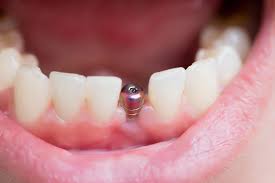Explore the Benefits and Risks of Dental Implants
For people who have lost one or more teeth, dental implants can help. But it is important to understand the benefits and risks of dental implants to determine if they are right for you.
Dental implants are fixtures inserted into the jawbone to replace missing teeth. A dental surgeon uses screw-like devices to insert an implant, serving as an anchor for the artificial tooth. If you are considering implants, consult with a Chicago implant dentist to discuss options.
Benefits and advantages of dental implants
Dental implants have a high success rate and can offer long-term benefits, but there are some situations where an implant is not appropriate and there are risks associated with the procedure. In some cases, patients may opt for dentures, or removable artificial teeth. But implants offer a number of advantages because they are:
- More natural and comfortable
- More successful as a long-term solution
- More reliable for chewing and eating
- A lower risk for cavities
- Better for maintenance of the bone where the original tooth was lost
- Not as likely to cause sensitivity in nearby teeth
- Easier to maintain and keep clean
Types of dental implants
When you consult with an implant dentist, you will learn about what’s required for the procedure and the two types of implants available. A dental implant surgeon must be able to insert the implant into healthy bones so it can bond with the jawbone.
The two types of dental implants are endosteal and subperiosteal. The more common endosteal implants are inserted into the jawbone, allowing attachment of one or more teeth. Subperiosteal implants are attached to the top of the jawbone when a surgeon find there is not enough height to a patient’s jawbone.
Risks of dental implants
Not everyone is eligible for the dental implant procedure, including people with:
- Acute illness
- Uncontrollable metabolic disease
- Disease or infection in the bone or soft tissue
- Smoking habits that are excessive
- Conditions like teeth grinding
- Psychiatric or behavior diagnoses
- Certain diseases, like diabetes, AIDS/HIV, osteoporosis
It’s possible that dental implant surgery will lead to complications that could result in the implant failing for people with these conditions or risks. A major concern for implant surgeons are complications, such as:
- Nerve damage
- Infection
- Implant movement
- Implant exposure above the gumline
- Incision opening after surgery
In some cases, a dental implant surgeon cannot proceed with the procedure until they can properly prepare the patient for the implant.
- Sinus augmentation: An implant surgeon may have to perform this procedure to lift the floor of the sinuses, which will allow more bone to develop to ensure a more successful implant. Placing an implant in the upper jawbone is usually difficult because of the location of the sinuses.
- Ridge modification: This procedure is necessary for people with a jawbone abnormality that limits the bone development needed for an implant. The procedure lifts the gum to expose the deformed bone, allowing the surgeon to replace, repair or rebuild it.
Dental implant cost and maintenance
An implant dentist can estimate the cost of your procedure and whether your insurance will cover expenses, which can vary based on a number of factors, including:
- How many implants are needed
- What type of implants are needed
- Where the implants will go in the jawbone
- Any additional procedures needed for the implants
Dental implants require the same regular brushing and flossing as originally teeth to ensure that they remain healthy. The dentist also will require regular followups to monitor the implants and the health of surrounding teeth and gums. Twice a year cleanings also are required.

